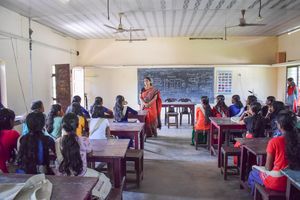Early this month I was chief guest at the convocation of an impressive new college of engineering in rural Kerala. As I handed out the certificates and awards, I was struck by four observations, which had been building up in my mind over the more than 50 such occasions at which I have officiated over the last decade, and which were reconfirmed for me yet again.
First, it is striking how many young people in our country are burdened with names that begin with the letter “A”. They are the offspring of a hyper-competitive generation of parents who wanted to equip their children with a name that would give them a seat in the first row, be called first on school occasions, and be served first whenever children were lined up alphabetically. Indian educational institutions, unlike western ones, usually go by first names and not surnames (unavoidably, since naming traditions vary so much within our country and even within communities). So a first name beginning with A is assumed to confer a great advantage. The problem is that too many parents had the same idea, so that often 25 per cent of a class consists of children whose names begin with A, thus nullifying some of the advantage. To restore the balance, parents have now started giving their kids names that start with “Aa”, like Aaron, Aashish or Aashiq! The last two, strictly speaking, don’t even need the second “a” and never used to be spelled that way a generation ago. (“Aasha” is no doubt round the corner!) Other parents go further and change names that used to be spelled differently, as names starting with other letters. Thus the Kerala name Ebin is now spelled Abin by many. One day we will probably see Urmila being spelled Armila. Where will this end, and when will parents learn to stop saddling their children with such oddities?
My second observation is that education is increasingly becoming a female preserve. In this college and in many other co-educational institutions where I have conferred degrees, girls were a minority—perhaps 30 per cent. Yet they were, as usual, a distinct majority of the high achievers. This seems to cut across disciplines—science and humanities, engineering and medicine, dental courses and ayurvedic studies, all have a preponderance of women excelling over men. (The one exception seems to be mechanical engineering, which is still largely, if not exclusively, a male field.) The bulk of the students may be men, but the toppers are almost always women. The 21st century is clearly going to belong to women, and we’ll all be much the better for it.
Third, the hunger for education is widespread and is driven mainly by parents who see in a good college degree the best hope for social advancement. It was striking for me to see parents in simple rural attire proudly watching their children, in graduation gowns and mortar-board caps, collecting engineering degrees earned in the English medium. But we are releasing our graduates into an employment ecosystem that may not be able to accommodate them. I was aware, though I did not mention it, that a study by the All-India Professionals Congress had established in Kerala that 66 per cent of engineering graduates ended up in jobs that did not require an engineering degree. It’s all the more essential to ensure that there is a connect between what students are taught and what the market-place needs.
Fourth, those black graduation gowns have to go. They are completely unsuitable for our climate and totally at odds with our colourful culture.
Instead of kids sweating in their gowns in sweltering weather, why not create an India-specific robe that consists of a kurta or jubba and a university-specific angavastram, both in appropriate university colours? As for the mortar-board tasseled caps, surely an Indian cap or turban would fit the bill better? My own preference would be for a gold-bordered Mysuru peta; and as for the tassels, you could replace them with metal pendants of the same provenance. We talk all the time of decolonising our education; why not decolonise our convocations, too?
editor@theweek.in


